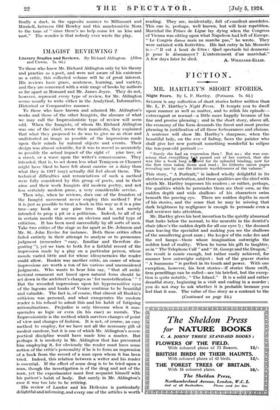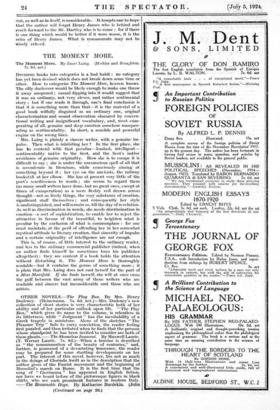FICTION.
MR. HARTLEY'S. SHORT STORIES..
Mr. L. P.. Hartley's Night Fears. It tempts you to dwell upon 'manner as well as matter, and to relish his episode—
extravagant or normal—a little more happily because of his fine and precise phrasing ; and in the short story, above all, the economy of the form demands the finest and most precise phrasing in justification of all those forbearances and elisions.
A sentence will show Mr. Hartley's sharpness, when the beautiful lady, on the eve of fading, faces the painter who shall give her new portrait something wonderful to eclipse the ten-year-old portrait
" Surely she had an expression then ! But no ; she was con- scious that everything lificl passed out of her control, that she was like a book long ,ared for its splendid binding, now for the first time taken down and read ; its hitherto uncut pages revealing one by one the intrinsic worthlessness of the volume."
This story, " A Portiait," is indeed wholly delightful in its alertness and penetration, and these qualities are the chief with which Mr. Hartley impresses his readers ; or rather, perhaps, the qualities which he 'persuades them are their own, as the sudden depth and wide shallows of his characters swim beneath the peering eye. There are sudden depths in most of his stories, and the sense that he may be missing that dark brightness by negligence is enough to persuade even a dull reviewer into attention.
Mr. Hartley gives his best invention to the quietly abnormal that lurks below the normal, to the neurotic in the dentist's chair (there's the sudden depth for all our eyes !) ; the doomed man leaving the specialist and making you see the shallows of the unsuffering great man ; the keeper of the coke fire and the red lamps—those whose imagination outweighs the sodden load of reality. When he turns his gift to laughter, as in " The Telephone Call " and " St. George and the Dragon," the result is comic enough, but rather easily achieved, for manner here outweighs subject ; but of the graver stories " A Summons "" is perfect in its touch and power. With one
exception, however, his best stories—if stories these swift, firm penciffings can be called—are his briefest, but the excep- tion is quite notable, " The Island." It is a solid and rather dreadful story, beginning in a visit and ending in a murder ;
you do not stay to ask whether it is probable because you feel that it was. The value of this story as a contrast to the (Continued on page 24.) rest, aA-well as-in itself, is considerable. ----It-tempts one to hope that the author will forget Henry. James who is behind and reach forward to the Mr. Hartley who is to come ; for if there is one thing which would be better if it were worse, it is the echo of Henry James. What is consummate inay not be Wisely echoed.



















































 Previous page
Previous page